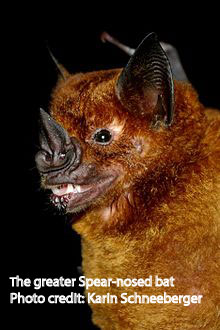NATIONAL SCIENCE FOUNDATION GRANT AWARDED TO BAT1K DIRECTORS
At Bat1K we care about bats and are interested in multiple research angles, the various backgrounds of Bat1K directors and affiliates. One of the things that make bats fascinating is the fact that bats live so much longer than other mammals of similar body size. While other mammals of equal size, such as mice, only reach 2 – 3 years, Brandt’s Bat (Myotis brandtii) lives up to ~40 years of age and is the longest living bat. Hence, understanding the mechanisms that allow these bats to reach this respectable age is a key research focus.
This year, two of our directors, Prof. Liliana M. Dávalos (Stony Brook University) and Prof. David Ray (Texas Tech University), were awarded a National Science Foundation (NSF) grant, to investigate “Genomics of exceptions to scaling of longevity to body size”. With this grant, they aim to use genomic analysis to understand how bats live this long by looking into closely related bat species that differ substantially in longevity. Along with their ability to live up to 10 times longer than expected by size, long-lived bat species have uniquely well-functioning immune systems. Prof. Dávalos and Prof. Ray expect this aids their longevity. By directly comparing the genomes, differences in genetic makeup, including those related to the diverging longevity, will stand out. But to obtain the genomes, different sequencing methods will have to be tested and compared, to see which will facilitate in the most complete and efficient method to use for future studies.
Congratulations, Prof. Dávalos and Prof. Ray on this achievement! We are very curious what they will find and hope we made you curious too. More information about the grant can be found here.
 Bat1K is a consortium, guided by experts in their fields, Prof. Dr. Emma Teeling (University College Dublin) and Dr. Sonja Vernes (Max Planck Institute for Psycholinguistics), along with dozens of bat researchers worldwide. The Bat1K goal is to unravel the secrets bat genomes hold, and to use these insights to both conserve species and aid in human health. This grant helps facilitate Phase 1 of Bat1K, in which we aim to sequence the genomes of representatives of the 21 families of bats (Chiroptera). Along with discovering the genomic basis of ageing, longevity and vocal learning, we aim to educate the public about bats. Although bats are sometimes portrayed as pests, bats provide key ecosystem services, from pollination to pest insect control. Besides contributing to genetics, the bat genomes enable us to inform and educate the public about the true beauty and diverse utilities of bats all across the world. Check out our website, to learn more about us and follow us on Twitter, to learn more about bats and bat conservation.
Bat1K is a consortium, guided by experts in their fields, Prof. Dr. Emma Teeling (University College Dublin) and Dr. Sonja Vernes (Max Planck Institute for Psycholinguistics), along with dozens of bat researchers worldwide. The Bat1K goal is to unravel the secrets bat genomes hold, and to use these insights to both conserve species and aid in human health. This grant helps facilitate Phase 1 of Bat1K, in which we aim to sequence the genomes of representatives of the 21 families of bats (Chiroptera). Along with discovering the genomic basis of ageing, longevity and vocal learning, we aim to educate the public about bats. Although bats are sometimes portrayed as pests, bats provide key ecosystem services, from pollination to pest insect control. Besides contributing to genetics, the bat genomes enable us to inform and educate the public about the true beauty and diverse utilities of bats all across the world. Check out our website, to learn more about us and follow us on Twitter, to learn more about bats and bat conservation.
Katharina Foreman
Bat1K Administrative Assistant
Wundtlaan 1
6525 XD Nijmegen
The Netherlands
Katharina.foreman@mpi.nl
info@mpi.nl



